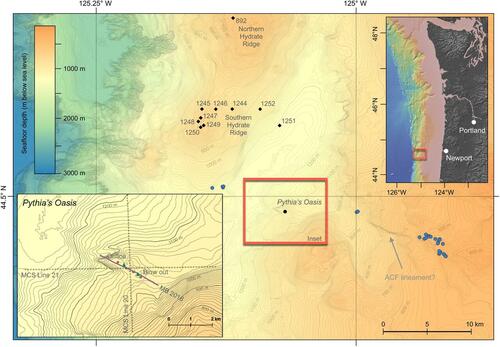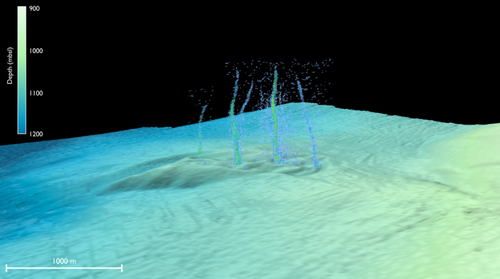
"Chemically distinct liquid shooting up from the seafloor" has been detected by researchers on a stretch of a 600-mile-long fault line in the Pacific Ocean, which is situated only 50 miles away from the Oregon coast, and could potentially trigger a catastrophic earthquake in the Pacific Northwest.

"Pythia's Oasis is a newly discovered seafloor seep on the Central Oregon segment of the Cascadia Subduction Zone, where focused venting emits highly altered fluids ~9°C above the background temperature. The seep fluid chemistry is unique for Cascadia and includes extreme enrichment of boron and lithium and depletion of chloride, potassium, and magnesium. We conclude that the fluids are sourced from pore water compaction and mineral dehydration reactions with minimum source temperatures of 150° to 250°C, placing the source at or near the plate boundary offshore Central Oregon," researchers at the University of Washington wrote in a study.

Researchers said the seep is nearly a mile below the surface of the ocean at the plate boundary and was first observed in 2015. They fear the leak could be a sign of future earthquake activity:
"The megathrust fault zone is like an air hockey table.
"If the fluid pressure is high, it's like the air is turned on, meaning there's less friction and the two plates can slip. If the fluid pressure is lower, the two plates will lock – that's when stress can build up," co-author Evan Solomon, a University of Washington associate professor of oceanography who studies seafloor geology, wrote.
Video of an underwater drone surveying the seafloor seeps.
The Cascadia Subduction Zone parrels several major West Coast cities, including Seattle and Portland, Oregon, as well as Northern California and Vancouver Island in Canada. And researchers fear the seismically quiet fault line could be awakened and "unleash a magnitude-9 earthquake in the Pacific Northwest."
“Chemically distinct liquid shooting up from the seafloor” has been detected by researchers on a stretch of a 600-mile-long fault line in the Pacific Ocean, which is situated only 50 miles away from the Oregon coast, and could potentially trigger a catastrophic earthquake in the Pacific Northwest.

“Pythia’s Oasis is a newly discovered seafloor seep on the Central Oregon segment of the Cascadia Subduction Zone, where focused venting emits highly altered fluids ~9°C above the background temperature. The seep fluid chemistry is unique for Cascadia and includes extreme enrichment of boron and lithium and depletion of chloride, potassium, and magnesium. We conclude that the fluids are sourced from pore water compaction and mineral dehydration reactions with minimum source temperatures of 150° to 250°C, placing the source at or near the plate boundary offshore Central Oregon,” researchers at the University of Washington wrote in a study.

Researchers said the seep is nearly a mile below the surface of the ocean at the plate boundary and was first observed in 2015. They fear the leak could be a sign of future earthquake activity:
“The megathrust fault zone is like an air hockey table.
“If the fluid pressure is high, it’s like the air is turned on, meaning there’s less friction and the two plates can slip. If the fluid pressure is lower, the two plates will lock – that’s when stress can build up,” co-author Evan Solomon, a University of Washington associate professor of oceanography who studies seafloor geology, wrote.
Video of an underwater drone surveying the seafloor seeps.
[embedded content]
The Cascadia Subduction Zone parrels several major West Coast cities, including Seattle and Portland, Oregon, as well as Northern California and Vancouver Island in Canada. And researchers fear the seismically quiet fault line could be awakened and “unleash a magnitude-9 earthquake in the Pacific Northwest.”
Loading…





